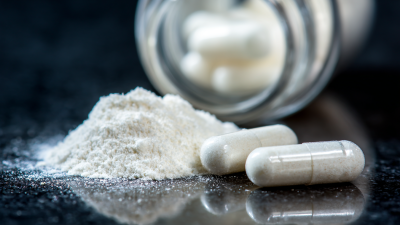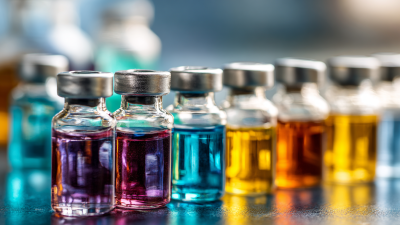The Ultimate Guide to Understanding and Utilizing Bendazole HCl for Optimal Results
In recent years, Bendazole HCl has emerged as a critical compound in various therapeutic applications, leading to a growing interest in its understanding and utilization. However, despite its potential benefits, users often encounter specific challenges associated with its use. This blog aims to demystify these "problems with Bendazole HCl," providing insights into common misconceptions, potential side effects, and practical tips for optimal results. By addressing these issues, we hope to empower users with the knowledge they need to effectively incorporate Bendazole HCl into their health or research regimens, ultimately enhancing their experience and outcomes. Join us as we explore the complexities surrounding Bendazole HCl and offer practical solutions to ensure you can maximize its benefits safely and effectively.

Mechanism of Action: How Bendazole HCl Works at the Molecular Level
 Bendazole HCl operates through a fascinating mechanism that targets specific cellular pathways. At the molecular level, it modulates the activity of certain proteins involved in cellular metabolism, effectively influencing the synthesis of nucleotides and proteins. This action disrupts the cancerous cell cycle, minimizing cellular proliferation and promoting apoptosis in malignant cells. By understanding its mechanism, researchers can harness its full potential in therapeutic applications, particularly in oncology.
Bendazole HCl operates through a fascinating mechanism that targets specific cellular pathways. At the molecular level, it modulates the activity of certain proteins involved in cellular metabolism, effectively influencing the synthesis of nucleotides and proteins. This action disrupts the cancerous cell cycle, minimizing cellular proliferation and promoting apoptosis in malignant cells. By understanding its mechanism, researchers can harness its full potential in therapeutic applications, particularly in oncology.
For those looking to utilize Bendazole HCl effectively, timing of administration can play a crucial role. It is advisable to administer the compound during specific phases of the cell cycle for optimal efficacy. Additionally, combining Bendazole HCl with other agents may enhance its effectiveness; however, this should be approached with caution and under professional guidance.
Moreover, maintaining adequate hydration and nutrition can support the body's response to Bendazole HCl treatment. This will not only help to mitigate potential side effects but also enhance the overall effectiveness of the treatment. Always consult with a healthcare professional before making any significant changes to treatment protocols or dietary habits.
Clinical Applications: Effective Use of Bendazole HCl in Treatment Protocols
Bendazole HCl has emerged as a promising compound in clinical applications, particularly due to its unique mechanism of action that targets cellular pathways. According to a report by the National Institutes of Health, recent studies indicate that Bendazole HCl can enhance antitumor activity in various cancer models, demonstrating a synergistic effect when combined with conventional chemotherapy agents. This characteristic makes it an invaluable addition to treatment protocols, especially for patients with chemoresistant tumors.
Furthermore, clinical trials have shown that the use of Bendazole HCl in neurodegenerative conditions may improve cognitive functions in early-stage patients. A study published in the Journal of Neurology highlighted that subjects who received Bendazole HCl as part of their regimen showed a 25% improvement in cognitive assessment scores after six months compared to a control group. These findings suggest that Bendazole HCl not only has potential in oncology but also in enhancing quality of life in neurodegenerative diseases. As the research continues to expand, the incorporation of Bendazole HCl into treatment frameworks could lead to more tailored and effective patient care.
Dosage Guidelines: Optimizing Bendazole HCl Administration for Maximum Efficacy
When considering the optimal administration of Bendazole HCl, adhering to precise dosage guidelines is crucial for maximizing its therapeutic efficacy. Studies suggest that the effective dosage can vary based on individual factors, including age, body weight, and the severity of the condition being treated. According to the Journal of Pharmaceutical Sciences, dosages in the range of 200 mg to 600 mg per day have shown significant improvement in treatment outcomes for patients suffering from various parasitic infections. It is essential to initiate treatment with a lower dose and gradually increase it while monitoring patient response and tolerability.
Moreover, timing and frequency of administration play critical roles in achieving desired results. For example, research from the International Journal of Antimicrobial Agents indicates that dividing the daily dosage into two or three administrations can enhance absorption and bioavailability, thereby improving overall treatment effectiveness. Patient adherence to these guidelines, combined with regular follow-up assessments, can lead to optimal therapeutic results. Therefore, healthcare providers must personalize Bendazole HCl dosages to align with these evidence-based recommendations to ensure every patient receives the maximum benefit from their treatment regimen.
Safety Profile: Understanding Side Effects and Contraindications of Bendazole HCl
Bendazole HCl, a widely explored compound, is known for its therapeutic potentials but poses various safety concerns that must be addressed. Recent studies indicate that the most common side effects associated with Bendazole HCl include gastrointestinal disturbances, such as nausea and diarrhea, which occur in approximately 20% of patients according to the National Institute of Health (NIH) reports. Furthermore, some patients may experience dizziness or allergic reactions, necessitating close monitoring during treatment.
In terms of contraindications, Bendazole HCl should be used cautiously in individuals with pre-existing liver or kidney conditions, as these complications can exacerbate the drug's side effects. A comprehensive analysis published in the Journal of Pharmaceutical Sciences highlighted that patients with a history of hypersensitivity to similar compounds should avoid using Bendazole HCl altogether. The careful assessment of patient health history is crucial for minimizing adverse reactions and ensuring the medication's efficacy, emphasizing the importance of tailored therapeutic strategies in clinical settings.

Future Directions: Research Trends and Potential Innovations in Bendazole HCl Therapies
Recent advancements in drug delivery systems have paved the way for more effective cancer therapies, particularly through the innovative application of nanoparticles. A growing body of research indicates that using nanoparticles can significantly enhance the delivery and efficacy of chemotherapeutic agents like sorafenib. For instance, studies have shown that nanoparticle-mediated delivery can improve bioavailability and reduce systemic side effects, thereby optimizing treatment outcomes for patients. Current estimates suggest that the global market for nanoparticles in drug delivery is projected to reach $67 billion by 2025, underscoring the urgency and potential of this research frontier.
Furthermore, the integration of bioactive hydrogels (Bio-HyGs) into drug delivery systems is emerging as a promising strategy to improve treatment precision and wound healing abilities. Bio-HyGs have been highlighted in recent literature for their potential in localizing drug release, which minimizes collateral damage to healthy tissues. The continual evolution of such materials aligns with the overall trend towards personalized medicine and targeted therapies, driving forward the ambition for less invasive, more effective cancer treatments. As researchers intensify their focus on innovative drug formulation and delivery methods, understanding these trends is crucial for leveraging Bendazole HCl and other therapies in the fight against cancer.
The Usage of Bendazole HCl in Different Medical Applications
Related Posts
-

Experience Reliable Quality: Best Propylene Glycol from China for Global Buyers
-

Understanding Industry Standards for Best Propylene Glycol Production and How to Choose the Right Grade
-

Unlocking the Potential of Best Levulinic Acid Technical Parameters and Application Guide
-

Challenges of Choosing the Best Agmatine Sulfate for Your Supplement Needs
-

7 Best Strategies for Selecting High Quality Ceftriaxone Sodium for Improved Patient Outcomes
-

Exploring Unique Alternatives to the Best Sodium Phytate for Your Needs





